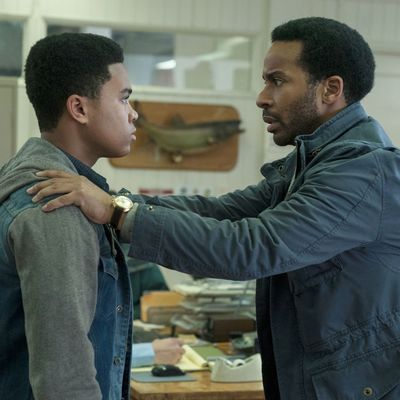
Weren’t we all a little nervous going into the season finale of Hulu’s Castle Rock? After all, even the most die-hard Stephen King fan will tell you that endings are not his strong suit. He has gotten a little better at it over the last 10–20 years, but it was a significant problem, even during his arguable prime in the ’70s and ’80s. So, if Hulu’s Castle Rock is really an ode to Stephen King, would it also screw up the ending?
Yes and no. People may be left unsatisfied by a show that builds up to a climactic moment in the woods (it had to end in the woods) and then kind of just jumps forward a year. And yet the ending fits thematically. Much of this season was about repetition and patterns — how evil continues to rise up in Castle Rock — and so isn’t it appropriate that the story ends somewhere close to where it began — with the Kid back in that cell, possibly stuck there for the rest of time? Evil will continue to surface in Castle Rock, and the alternate version of Henry Deaver will forever remain the same age. There’s something appropriate about that being the landing point for a show dedicated to a man who seems to always find a new way to scare us.
On that note, we haven’t really talked about how the meta reading of this season beautifully ties in with King’s work. Think about it: Castle Rock turned out to be about a thin portal between worlds, one that connects alternate timelines in which the same people live slightly different lives. Isn’t that not unlike King’s literary output? A number of his books take place in the same small towns with names that repeat but stories that change. One of the master strokes of Castle Rock was how its grand mystery reflected that of a writer creating alternate universes for his favorite characters and locations through its narrative.
As for the actual recap of “Romans,” it’s arguably the least plot-heavy episode of the season. Henry Deaver goes to the woods with the other Henry Deaver, points a gun at him, sees a demon, and then does what Warden Lacy did years ago — he puts that demon in a cage. Does Henry believe the Kid’s story? Maybe a bit less than Molly but we also learn how far Henry is willing to go to protect himself and those he loves. We see in flashback that, yes, young Henry pushed his father off the cliff, spurred to do so after learning that Matthew Deaver was planning to kill Ruth Deaver for the sin of infidelity. It’s important to note that the episode opens with the season premiere speech from Henry, in a courtroom, commenting on the lack of doubt needed to take a life. He made that decision then and he makes a decision now to imprison the Kid yet again, so he can’t cause anymore death in Castle Rock.
So where does everyone else end up at the end of the season?
After a great scene with Molly on the bridge about living the same moments over and over again, Ruth Deaver gets one more moment with Henry, before we learn in the epilogue that she died a few months later, buried next to the love of her life, Alan Pangborn.
Molly Strand has kind of a disappointing close, moving to the Florida Keys, where she continues to sell real estate. Guess it’s better than getting shot in the Maine woods.
Warden Porter has an ironic fate: run over by a Department of Corrections bus moving inmates once housed at Shawshank, which is closing because of the recent massacre. The sequence that follows from there — with the prisoners being taken into a cell across from “The Henrys” and spurned on to violence by the one of them who doesn’t belong — is as harrowing as the show has been all year. It’s also perhaps the moment in which our Henry truly realizes he has to stop the Kid and not go through with whatever he wants him to do. Perhaps the Kid being in this universe is causing evil, or perhaps he would cause the same evil back in his own. Whatever the case, Henry knows he needs to be stopped.
One year later, Molly is gone, Ruth is dead, and Wendell and Henry are playing chess. Henry says in voiceover, “You’re here now. This is who you are. This is where you live. This is where you’re from.” Was Castle Rock about how little we can do to avoid the inevitable? We can explain away evil in the world and use words like fate and destiny, but sometimes we just have to accept the cards we’re dealt. A lot of King work is about how little control human beings actually have against the greater forces at play in this world. In keeping with that, Henry Deaver now has to accept his role as the new Warden Lacy — at least he has the heart to give his prisoner a treat on Christmas.
Wait! There’s a tag! After the first credits, we get a fun scene with Jackie Torrance, who is writing a book called Overlooked (a reference to the Overlook Hotel from The Shining, of course). “The best place to finish a book is where it started,” she says, ending this story that clearly owed a great deal to that of her uncle’s battle with pure evil in one of King’s most famous books. Five words: Bring Jackie Back Next Season.
Four Past Midnight
• The recap of this episode is a thing of simple beauty: “Some birds can be caged.”
• Nicole Kassell does a solid job here, but I’d love to see some more stylish directors tackle season two. What if they could rope Mike Flanagan, the current King of King (Gerald’s Game and the upcoming Doctor Sleep, the sequel to The Shining) into doing an episode? How about Ari Aster (Hereditary) or Robert Eggers (The Witch)? Now that the pedigree of this show has been settled and it can stand on its own, bringing aboard some indie horror talent to really amp up the tension next year would be a great idea.
• On that note, what do you want from season two? What source material from King or new ideas could Castle Rock explore? And who was your MVP of season one? (I’m going Sissy Spacek all the way.)
• Thanks for reading all season! Now go catch up with some of the best King work you haven’t read. His newest, The Outsider, is pretty solid. Who knows? Maybe it will be the template for the next season of Castle Rock.


